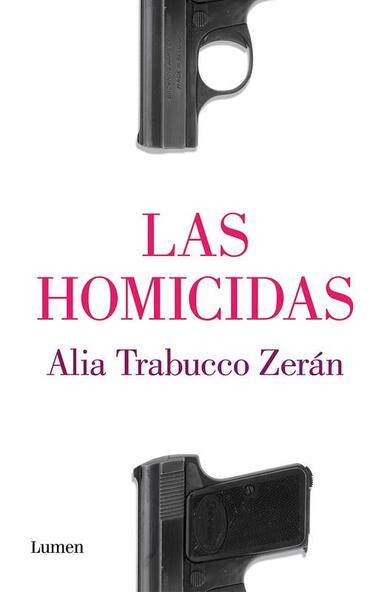Las homicidas
Alia Trabucco Zerán
|
A thoughtful interdisciplinary study on the relationship between criminal law, gender, and femininity, Las homicidas traces the murders committed by four Chilean women — Corina Rojas, Rosa Faúndez, María Carolina Geel, and María Teresa Alfaro — over the course of the 20th century. But rather than fixate on the oft-quoted sensational aspects of these crimes, Alia Trabucco Zerán interrogates the various ways in which Chilean society reacted to, immortalized, and made sense of these offenses—and their perpetrators. Whether it is the systematic killing of a well-to-do family’s children or the dispersal of a dismembered husband’s body throughout Santiago de Chile, the shocking cases recounted in these chapters have lived on in plays, newspaper articles, feature films, dance performances, and brochures. Notably, these renderings tend to portray the homicidas’ killings as the fruits of unbridled jealousies, uncomplicated crimes of passion that could be easily written off as aberrations. Often, the culprits were deemed to be mentally ‘insane,’ or even branded as ‘false women’ because they exhibited distinctly ‘masculine’ features and temperaments. They were mere outliers, in other words. Nothing more. |
Trabucco Zerán, however, offers a more nuanced reading: instead of attributing her subjects’ violence to ‘female emotionality’ or pathologies, the author expands her scope to consider the killers’ social, economic, racial, and ethnic backgrounds. More specifically, she pays close attention to how gender intersected with these other facets of their lives, producing complex material conditions that ultimately circumscribed Rojas, Faúndez, Geel, and Alfaro’s opportunities and thus shaped their behaviors. The Chilean author also draws on court transcripts, newspaper articles, and other primary sources to interpret these women’s motivations and lethal actions. In doing so, she demonstrates how the prosecution of these murderesses depended not entirely upon the gravity of their crimes, but largely upon the degree to which the accused had transgressed the gender codes endorsed by Chilean society and culture. Their crimes were not limited to the killings they carried out – they also included (and were often overshadowed by) the women’s infringements upon the confines of their assigned gender roles.
In Las homicidas, then, Corina Rojas, Rosa Faúndez, María Carolina Geel, and María Teresa Alfaro are transformed. Long dismissed as exceptions – labeled “witches, Medeas, vampires, [and] femmes fatales” for violently transgressing the bounds of what it means to be ‘proper’ women — the homicidas emerge from this investigation as actual, sentient human beings. Trabucco Zerán acknowledges her subjects’ capacity to destruct and wound and deceive on their own volition, recognizing their agency even as she grounds their violence within the context of their sociopolitical circumstances. As a result of her empathic analysis, the stories in this book cease their role as cautionary tales levelled at nonconformist women, and instead reveal themselves as proof of Chile’s narrow conceptions of womanhood and femininity. Riveting and unapologetic, Las homicidas underscores the need for a more equitable society, a world that does not seek to repress the possibilities of what women can do and say and be.
Alia Trabucco Zerán is a Chilean writer. Born in 1983, Trabucco Zerán holds an MFA in Creative Writing in Spanish from New York University and a PhD in Latin American Studies from University College London. Her novel The Remainder (2019) was shortlisted for the Man Booker International Prize.
Las homicidas is a publication by Penguin Random House Grupo Editorial. Click here to purchase.
In Las homicidas, then, Corina Rojas, Rosa Faúndez, María Carolina Geel, and María Teresa Alfaro are transformed. Long dismissed as exceptions – labeled “witches, Medeas, vampires, [and] femmes fatales” for violently transgressing the bounds of what it means to be ‘proper’ women — the homicidas emerge from this investigation as actual, sentient human beings. Trabucco Zerán acknowledges her subjects’ capacity to destruct and wound and deceive on their own volition, recognizing their agency even as she grounds their violence within the context of their sociopolitical circumstances. As a result of her empathic analysis, the stories in this book cease their role as cautionary tales levelled at nonconformist women, and instead reveal themselves as proof of Chile’s narrow conceptions of womanhood and femininity. Riveting and unapologetic, Las homicidas underscores the need for a more equitable society, a world that does not seek to repress the possibilities of what women can do and say and be.
Alia Trabucco Zerán is a Chilean writer. Born in 1983, Trabucco Zerán holds an MFA in Creative Writing in Spanish from New York University and a PhD in Latin American Studies from University College London. Her novel The Remainder (2019) was shortlisted for the Man Booker International Prize.
Las homicidas is a publication by Penguin Random House Grupo Editorial. Click here to purchase.
|
Comment Box is loading comments...
|
|









